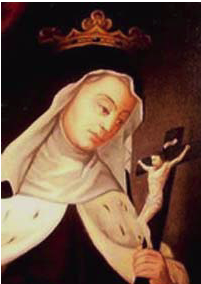 |
November 5 Blessed Frances d’Amboise Religious |
Optional Memorial
Frances was born in 1427, probably in Thouars in France. She was the wife of Peter Il, Duke of Britanny. After his death, and under the direction of Blessed John Soreth, the prior general, she took the habit of the Order in the monastery she had previously founded in Bondon. Afterwards she transferred to another foundation in Nantes, also erected by her, where she held the office of prioress
and nourished the sisters with wise teaching. She is considered the foundress of the Carmelite nuns in France. She died in 1485.
From the Common of Women Saints (Religious), except the following:
Office of Readings
The Second Reading
From the Exhortations of Blessed Frances d' Amboise to her nuns
How trials bring strength
Whatever the troubles and difficulties that weigh you down, bear them all patiently andkeep in mind that these are the things which constitute your cross. Offer your help to the Lord and carry the cross with him in gladness of heart. There is always something to be endured, and if you refuse one cross, be sure that you will meet with another, and maybe a heavier one. If we trust in God and rely on his help, we shall overcome the allurements of vice. We must never let our efforts flag nor our steps grow weary, but must keep our hearts under steady discipline.
Consider the afflictions and great trials which the holy Fathers endured in the desert. And yet the interior trials they suffered were far more intense than the physical penances they inflicted on their own bodies. One who is never tried acquires little virtue. Accept then whatever God wills to send, for any suffering he permits is entirely for our good. Christ assures us in the Gospel, "Who wishes
to follow me must deny himself. He must be forgetful of self; he must regard himself as nothing; he must despise himself and desire to be despised by others." This attitude derives from Our Lord's command that we are to take up his cross and follow him. We are to accept sufferings of mind and body for love of him, just as he bore his sufferings for love of us. It is true that the Jews lifted the cross
from our Savior's shoulders, but this was out of concern lest he die from blows and exhaustion before reaching the place where he was to be crucified. And when they laid the weight on Simon's shoulders he submitted most unwillingly, even though aware that he was not destined to die on the cross he carried. Christ, by contrast, willingly and gladly carried his cross and died upon it, breathing
forth his soul at last into his Father's hands. Let us follow him and imitate all he did.
You have various afflictions which constitute your cross. Bear them willingly to the very end, when you will finally yield your soul to God. Give him praise and thanks for calling you to his service. Scorn no-one, for it is God's will that you
love each one of your neighbors as you do those of your own community. Strive to curb all unruly instincts within you. To this end try one remedy today and another tomorrow, so that gradually you will subdue your unruly impulses, andwhen the Lord sees your good will and your perseverance, he will give you the support of his grace, enabling you to sustain to the end the burdens of religious
life. Through his love nothing will be too difficult for you to bear.
Responsory
R. If our Lord allows us to suffer, this is a sign that he loves us and wishes to draw us to himself. * This is a great honor for us.
V. The straight path which leads to heaven is the cross; it is the main door. * This is a great honor for us.
Prayer
God our Father,
you called Blessed Frances d'Amboise
to seek your kingdom in this world
by serving Jesus Christ and his Blessed Mother.
With her prayers to give us courage,
help us to go forward with joyful hearts
in the way of love.We ask this through our Lord

